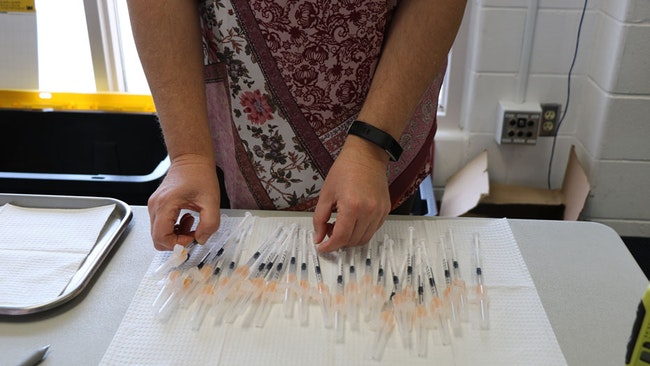
The final county-sponsored immunization clinic was held at Four Rivers Cultural Center last week. The county still lags behind most of the state in the percentage of residents who received a Covid vaccine. (The Enterprise/Liliana Frankel).
ONTARIO – The state goal of immunizing 65% of Malheur County’s population against Covid remains elusive nearly six months after a vaccine became widely available.
According to data released by the Malheur County Health Department last week, the county is the second worst among counties in Oregon for percentage of total population vaccinated.
The data shows 26% of Malheur County’s population has been vaccinated.
Just over 8,000 doses of Covid vaccine have been administered in Malheur County, according to the health department.
“We’d need to double that number to reach 65%,” said Sarah Poe, Malheur County Health Department director.
The county hosted its last vaccine clinic on Thursday, May 27, at Four Rivers Cultural Center. The shots were free – and those who received the shot walked away with a $20 gift cards from Alberstons, Red Apple or True Value.
Poe said 151 doses were administered at the clinic – including 98 Moderna doses, 23 first-dose Moderna shots and 30 Johnson & Johnson doses.
Still, vaccinations lag the most in rural areas of the county. Just 30% of the Vale residents have been vaccinated while 28% of the population in Ontario and Nyssa have been inoculated.
According to state data, 3.7 million doses of Covid vaccine have been administered in Oregon.
The low vaccination rate for the county can be traced to a variety of factors, said Poe.
“For some it is an issue of convenience. Some have questions they wanted answered. Some want more time to assess. For some it is just not a priority,” said Poe.
Poe said misinformation along with a more suspicious attitude regarding government also appears responsible for the low vaccination rate.
“This is a very different environment than, say, post-polio where we had this huge faith in science and government and the process that brought us the vaccine. Then people were max vaccinated. Now people don’t necessarily trust the system,” said Poe.
The low Covid vaccination rate also stretches across social economic issues, said Poe.
“It is really a rich versus poor issue,” said Poe.
Poe said poverty, race, education and Covid are a “complex issue.”
“Part of the work we have to do is building up confidence in science and health literacy and the process that developed the vaccines,” said Poe.
The reluctance in Malheur County, she said, is “much worse than I would have guessed.”
“It translates, honestly, into much bigger problems that have to be part of our solution but the reality is we might not have the same outcomes as everyone else,” said Poe.
State data show vaccine rates especially lag among the Hispanic population in Malheur, Harney, Lake and Klamath counties.
Only 13.6% of the Hispanic population in those counties combined have been vaccinated against Covid.
“People that are in the counties with the least amount of money per capita are also the counties that are the least vaccinated,” said Poe.
The situation is vexing for public health officials. On one hand a solution – a vaccine – is readily available but fewer people are lining up for shots.
“The solution is here. It is available. If you don’t want the vaccine, what is the solution? We’ve lost so many people in our community and state. I don’t know what the alternative is,” said Poe.
The county has recorded 63 Covid-related deaths since the pandemic emerged locally a year ago.
Conspiracy theories, said Poe, continue to haunt the vaccination effort.
“De-mystifying” those theories will be important going forward, she said.
“The answer is more and more access and convenience and, at the same time, educating people,” said Poe.
One well-known theory postulates a Covid vaccine could be dangerous to a woman’s reproductive health. Poe said concerned individuals should look to reputable sources to find out if such a theory is true.
“What I would really look to is the American Association of Obstetrics. Look at what the leading experts have to say,” said Poe.
The end of the weekly clinic at Four Rivers Cultural Center will not mean the end of vaccinations, said Poe.
“We will be doing much smaller efforts and working with other providers,” said Poe.
Poe said, for example, beginning in June, the health department will provide vaccines by appointment.
Poe said the health department will also continue to offer vaccinate to those in the county who are homebound or otherwise limited in accessing the serum.
“If you are struggling to get the vaccine we will get you vaccine,” said Poe.
News tip? Contact reporter Pat Caldwell at [email protected] .
Previous coverage:
Oregon could open at 70% vaccination, but Malheur County isn’t halfway there yet
Top Malheur County health official says more vaccine needed to stymie Covid
SAFEGUARD YOUR LOCAL NEWS
Take one action today to help the Enterprise grow and do more for the community through accurate, fair reporting.
SUBSCRIBE: A monthly digital subscription is $5 a month.
GIFT: Give someone you know a subscription.
ONE-TIME PAYMENT: Contribute, knowing your support goes towards more local journalism you can trust.




